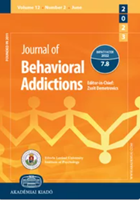Distortions in time perception related to videogames, pornography, and TV series exposure: An experimental study in three independent samples
Distortions in time perception related to videogames, pornography, and TV series exposure: An experimental study in three independent samples
Author(s): Veronica Cervigón-Carrasco, Rafael Ballester-Arnal, Joël Billieux, Beatriz Gil-Juliá, Cristina Giménez-García, Jesús Castro-CalvoSubject(s): Clinical psychology, Behaviorism, Substance abuse and addiction, Health and medicine and law
Published by: Akadémiai Kiadó
Keywords: time perception; time estimation; time passage; problematic gaming; problematic pornography use; binge watching;
Summary/Abstract: Background and aims: Time perception is a cognitive process involving both the ability to estimate the duration of an event (time estimation, TE) and the subjective perception of its passage (time passage, TP). Studies show that alteration in TE/TP is associated with substance use disorders. However, little is known about the impact of these alterations in potentially problematic online behaviors. We explore TE and TP while participants were exposed to cues related to videogames, pornography, and TV series, and the relationship of TE and TP with scores from instruments that measure problematic gaming (PG), problematic pornography use (PPU), and problematic binge-watching (BW). Methods: Participants from three independent samples (40 men from Luxembourg; 99 Spanish men, 111 Spanish women) completed an experimental task designed to assess TE and TP while they were exposed to short clips related to videogames, pornography, TV series, and documentaries (control condition). Participants also completed different self-reports. Results: Whereas men underestimated the time that they were exposed to pornography and TV series, women overestimated it. For videogames, we showed a consistent pattern of overestimation of time duration. Time was systematically perceived as passing faster while participants were presented with TV series and pornography. Regarding the association between time perception and PG, PPU, and BW, TE did not correlate with any of the indicators of problematic engagement assessed; but TP correlated with several of these indicators. Discussion and conclusions: The present preliminary results showed mixed evidence regarding the involvement of time perception in gaming, pornography use, and binge-watching.
Journal: Journal of Behavioral Addictions
- Issue Year: 12/2023
- Issue No: 4
- Page Range: 938-952
- Page Count: 15
- Language: English

